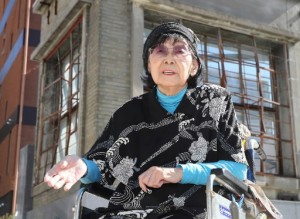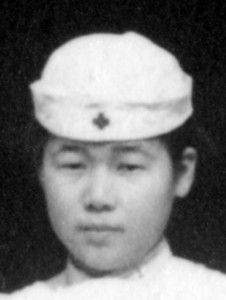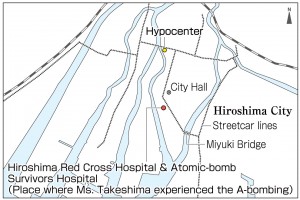Naoe Takeshima, 87, Naka Ward, Hiroshima
Dec. 1, 2015
Carried on nursing A-bomb survivors with a sense of mission
by Yuji Yamamoto, Staff Writer
On the day the atomic bomb destroyed the city, Naoe Takeshima, 87, was a 17-year-old nursing student frantically helping with relief efforts at an aid station set up on the grounds of the Hiroshima Red Cross Hospital (today’s Hiroshima Red Cross & Atomic-bomb Survivors Hospital). Ms. Takeshima had been wounded in the bombing, too, her left leg rendered immobile, but the lines of survivors were waiting for medical care. Unable to dwell on her personal plight, she felt a duty to help others.
She was three years old when the Manchurian Incident took place, and thereafter grew up amid a series of wars waged by Japan. Hoping to help the nation by serving on the front lines, she sought to become a nurse in the field. After graduating from Hiroshima Prefectural Joge Girls’ High School (now Joge High School) and leaving home, Ms. Takeshima entered a nursing program at the hospital.
When Hiroshima was attacked with the atomic bomb, she was a second-year student. That morning she was in a first-floor room of the student dormitory, which stood next to the hospital, about 1.5 kilometers from the hypocenter. While chatting with friends on the lower bed of a bunk bed, she was bathed in a flash of light. With a shout of “Incendiary bombs!”, she ducked down, covering her eyes and ears with her hands. At that moment, she became trapped under the falling building.
She came to at the sound of a voice, crying for help. It was a younger girl next to her. In the pitch darkness, a ray of light was slipping in through the crumbled walls. She was unable to move, though, because her body was pinned down by a pillar. After a while, she was freed from the debris and pulled out by a soldier who had been hospitalized and was now helping others.
Her left leg turned purple as her thigh had been crushed by the pillar. She was unable to move it. When the student nurses who had been rescued came together in the court yard, the head nurse told them to help with relief efforts at the front of the hospital. So they moved to a makeshift aid station set up by the entrance. Ms. Takeshima used a pole for support and managed to hobble there.
When she reached the aid station, she found long lines of survivors stretching down to the road along the streetcar tracks. They were standing from City Hall to the north to Miyuki Bridge to the south. Holding their arms straight out, they stood with their skin burned and peeling down from their bodies. Though the nurses were supposed to provide medical care, they had no tweezers or gauze. She put her palms in a container of zinc oxide oil, for burns, and applied this to the burnt flesh of the patients. She saw a classmate whose face had turned a shade of pink from the glass fragments that were dotting her face.
Recalling the time, Ms. Takeshima said, “I didn’t eat or drink. I was able to continue caring for the wounded because I had lost all emotions. If I had felt pity for them, I couldn’t have gone on.” Her words revealed how she simply did her best with the people right in front of her, unaware that she was suppressing her feelings. She went on with her nursing duties until finally she returned home on August 11 after suffering inflammation in her chest.
After the war, she became a nurse at elementary schools in the town of Joge and in the city of Hiroshima. Even after reaching the mandatory retirement age, she continued serving as a nurse at a junior college. Her career lasted 48 years, until 1994, working with children at a variety of schools. When she would share her A-bomb account in peace education classes, she said, “Waging war leads to these consequences. We must cherish human life.”
Over the many years she spent working with children, she began to sense certain changes in them. “My feeling is they no longer have as much consideration for others,” she said. Seeing the world from the perspective of others, not merely from our own vantage point, leads to respect for life and the desire to promote peace. But along with the freedoms of our society, there are children who have come to think only of themselves.
Japan’s strong economic growth has produced a rise in the number of nuclear families. Some children come to school without eating breakfast and some families engage in minimal communication among themselves. There are now more parents who were born after the war and don’t know the horror of that war directly, which means they don’t generally take the time to convey the dangers of war to their children. Ms. Takeshima said, “I hope families will talk about the importance of peace at home, too.”
Teenagers’ Impressions
Horrified by what was taken for granted
Ms. Takeshima told us that she wanted to go to the front lines to help as a nurse. Such a thing was taken for granted 70 years ago. Today, if someone of my generation said this, it would be strange. For me, living with my precious family and practicing my favorite sport, badminton, are things we would take for granted. War is horrifying because it changes the things in a girl’s life that we take for granted. (Hinako Okada, 13)
A-bomb deprived people of humanity
In the aftermath of the atomic bombing, Ms. Takeshima felt only a sense of duty to carry out the relief efforts. I was amazed at how she could focus on treating the survivors after suffering her own injuries and horrific experience. She said that she lost all emotions and felt no pity for the people who were badly burned. It all deepened my feeling of horror for the atomic bombing, which not only damaged people’s bodies, it deprived them of their feelings of humanity. (Nozomi Mizoue, 16)
Strong desire for a peaceful world
Ms. Takeshima pointed out that young people today don’t have a strong will. Compared to that time of war, we enjoy a lot of freedom. But since we live in a free society, we tend to feel apathetic toward politics and the history of other nations. I feel uneasy about the possibility that we might get involved in another war, unless we hold a strong desire to be happy and create a peaceful world. (Reiko Takaya, 16)
(Originally published on November 16, 2015)










